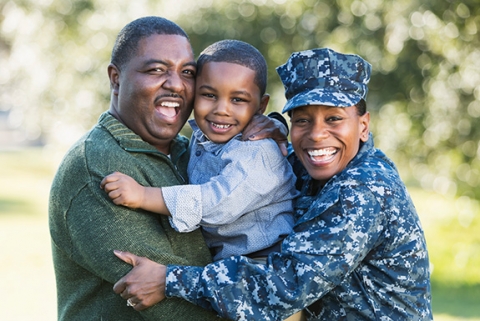Military Families
Military Families

Military service members and their families face an array of unique and often difficult challenges. The disruptions of deployment to family life are numerous and can be distressing to all involved. Repeated deployments, frequent moves, separation from loved ones, and reintegration issues upon return are common obstacles military families must get through together. Children are commonly required to relocate, change schools and make new friends. For children, wartime deployment typically means separation from a parent, daily feelings of uncertainty, and even an increased sense of danger. The fear and anxiety potentially experienced by military children could even disrupt brain development. Children are not as emotionally equipped as adults to cope with long-term separation. During deployment, children report higher levels of sadness and worry across age groups, and 1 in 4 children experiencing deployment of a parent report depressive symptoms. Military children are at increased risk for academic problems and, depending on the length of the deployment, significant behavioral health problems. Researchers found that behavioral and stress disorders increased by 18% to19% in children (ages 3-8) when a parent deployed, with a concurrent 11% increase in outpatient visits for youth emotional and behavioral health care.4
Families can provide vital support to their service members during their mission, and an even greater support upon their return. The family must live with readjustment issues when a service member returns from deployment. For example, it is estimated 30% of returning soldiers from Iraq and Afghanistan have experienced PTSD, depression, and/or traumatic brain injuries, and comorbidites such as aggression or alcohol misuse are found in approximately half of those with such impairments.5 Moreover, in one major study of 60,000 Iraq and Afghanistan veterans, 13.5% of deployed and non-deployed veterans screened positive for PTSD, while other studies show the rate to be as high as 20% to 30%.6
The service member and family system as a whole changes over the duration of the deployment. These changes can make the transition to being back together a difficult one; however, setting realistic expectations for the reunion by keeping in mind some of these changes can aid in the process. Through deployment, children grow older, may take on new responsibilities, become more independent, and learn to rely on the parent who remained at home. Service members change, whether it’s voluntary as a way to increase survival in their deployment, or involuntary related to exposures that require adaptation. Of all family members, spouses may be required to make the most changes during the deployment. As a result of such changes, the return to “normal” may look much different, but not all change is negative. Reunions might be difficult, but overcoming challenges together can make some families feel even closer.
Some challenges are normal and families can successfully manage them as a unit. Others are not as easy to cope with and require additional help and support. The website for the Department of Veterans Affairs has a wealth of information and resources to meet the needs of Veterans and their families. Additionally, many bases offer counseling services to military families and there are a number of organizations dedicated to promoting the wellbeing of military families.
Below is a list of local and national organizations:
Bedford VA Medical Center - Mental Health Services
